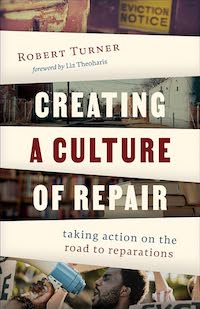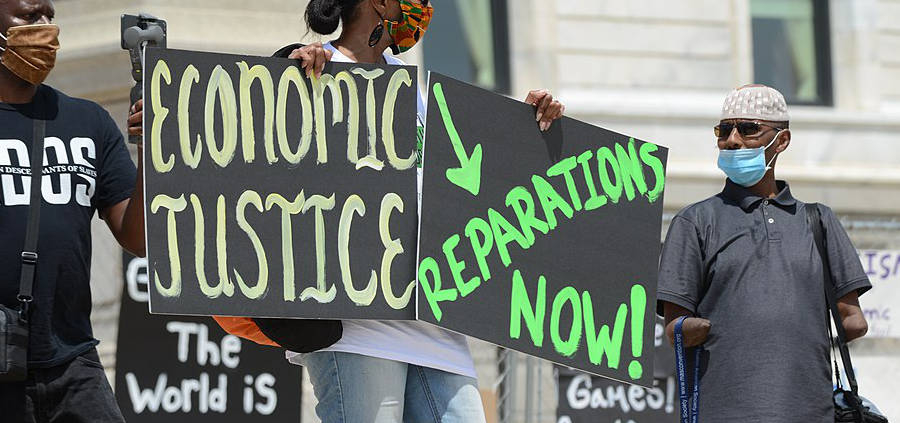Guarding the Paths of Justice by Douglas C. MacLeod Jr.

Creating a Culture of Repair:
Taking Action on the Road to Reparations
By Rev. Dr. Robert Turner
Westminster John Knox Press, 2024
$20 204 pp.
America’s justice system is broken. This is not a contemporary problem. Politicians and pundits regularly attempt to bamboozle the general public into believing history never existed and the United States is not systemically racist. To have this mentality is delusional, but many millions believe the fallacy. Yes, they would agree that racism exists in America; however, they say, America’s institutions, which were designed by our white forefathers (many of whom owned slaves) were not bigoted and faithfully followed the rule of law without prejudice.
As Rev. Dr. Robert Turner writes in his new book, Creating a Culture of Repair: Taking Action on the Road to Reparations, these individuals wrongfully “insist that racism is an aberration in American history, not the consistent theme” while also being “ignorant to the fact that while the racist laws may be changed or no longer enforced, the racist culture that they created and sustained still remains.” Those who defend or subscribe to this ideology, which precludes reparations for Black families affected by historically violent forms of oppression, claim that learning about this history is dangerous for children and unpatriotic; but, according to Turner, this position is fueled more by discomfort and fear. He uses this revelation as just one of the foundations for his effective and boldly stated argument, which is: “Reparations are a vital part of the medicine America needs to take in order to have true racial healing”, and that “reparations are not merely given; they are a matter of justice.”
Turner is the senior pastor of Baltimore’s Empowerment Temple and former pastor of the historic Vernon AME Church in Tulsa, Oklahoma. Ultimately, he is successful in laying out what needs to be done by the government and the general population to ensure that America’s Black communities receive what they need to thrive, including essentials like food, clothing, shelter, and medical benefits. He adds to these additional guarantees such as cessation and assurance, restoration, compensation, contrition, and rehabilitation. These steps toward true reparation, which were presented by the United Nations as a reiteration of the 2006 “Basic Principles and Guidelines on the Right to a Remedy and Reparation for Victims of Gross Violations of International Human Rights Law and Serious Violations of International Humanitarian Law,” and which provide context to such advocacy groups as Black Lives Matter, will allow the nation to come together and “create a culture of repair,” he writes.
When mass-media outlets and talking heads discuss reparations, the discussion often falls into two reductionist categories: 1) state and/or federal governments must pay back Black community members because they have been systemically oppressed for generations; or, 2) our country no longer has slavery, the past is the past, and the Black community should just move on and build up their own forms of generational wealth. Being wise, practical, and God-centered, Turner deconstructs this binary opposition, which is persuasive but unreliable. He reminds those who claim they had “nothing to do” with the practice of slavery actually have agency over how reparations are distributed.
Turner divides Creating a Culture of Repair into four categories of reparations—individual, societal, institutional, and spiritual—which include one hundred subcategories, a guide for everyday folks and the powerful “one percent” to help the Black community get the justice it deserves.
Our governmental institutions have an obligation to make reparations; however, to leave it entirely to these institutions, which have been historically racist, will ensure nothing gets done. Turner believes that each of us has a part to play. As he states, “Individualism is at the heart of the American dream,” and individual liberty, “epitomized in the Bill of Rights, is the backbone of our democracy.” He suggests a variety of actions for the white community: acknowledging their privilege; supporting Black-owned businesses; checking their family history; decolonizing their bookshelf; thinking before calling the police; visiting historical sites; writing op-eds and social media posts; running for office; hosting conversation parties; becoming members of Black organizations; providing bail assistance; sponsoring phone calls between children and incarcerated parents; and voting.
Making these changes on an individual level will provide reparation to the Black community. Turner makes it easy for those who may be well intentioned, or who genuinely believe they cannot do anything to help the Black community, to stop being “armchair activists” and act. By being more action oriented rather than passive observers, those who support underserved and underfunded Black communities can provide more tangible, measurable resources along with economic stability.
Turner recounts how the development of individualistic, grassroots movements lead to the creation of societies, the repairing of institutions, and the expansion of the spirit. His profound messaging stems from his extensive knowledge of American history and his understanding of Biblical teaching and analysis. Throughout Creating a Culture of Repair, he uses Scripture to illustrate his points in a nonobtrusive way. His faith is palpable but never overbearing. He knows the many sides of his argument and objectively explains them so readers can feel comfortable with the material while also making concrete changes for required reparations.
Not providing reparations and adhering to racist ideologies are sinful injustices that negatively affect everything from homeownership and street and school names to medical research and the way we bury the dead. Wicked thoughts, malevolent behaviors, and compulsive decisions without any foreknowledge as to what the ramifications are lead to a dangerous and sometimes deadly form of ignorance that attempts to eradicate from textbooks the inexplicable horrors perpetrated by a variety of white societies on African American communities. Many of these societies were and are headed by officials who use these important issues as distractions to deter individuals from speaking up about the core injustices taking place all across the United States.
This means that Black community members’ voices are intentionally squelched so reparations, which are rightfully owed, are not paid. Instead, the can is kicked down the road while white-majority institutions continue to say they will help Black communities through oversight committees, home financing and land grants, improved wages and employment opportunities, infrastructure bills, stronger support services for Black veterans and students, and less stringent laws that lead to mass incarceration. True, these are wonderful initiatives, but without buy-in from individuals and societies, these types of reparations—and dozens more—die on the vine.
Also included in these institutions, according to Turner, are church members “who were also practitioners of racism.” Turner states that the “Bible was misused and abused to support slavery”, which is antithetical to Jesus’s teachings. Sometimes there is open bigotry, and sometimes there is a quiet racism that leaves white church leaders with a “spiritual laryngitis that hinders them from speaking out against racism and horrific acts of racism.”
Very much like individuals, societies, and institutions, the Christian spirit itself needs repairing. To accomplish this, Turner believes that churchgoers and leaders must research church history, fund Black church renovations, organize church listening sessions, study publications on religion and racism, celebrate Black History Month and Juneteenth, “destroy the idol of a White Jesus”, and confess, apologize for, and denounce church racism. In essence, white Christians have a moral obligation to take action and “repair injustices and create equity so that this great country on earth [sic] can soar to higher heights.”
Ultimately, Creating a Culture of Repair intensely delineates between what is right and what is wrong; what is fair and what is unfair; what is going against God and what is righteous. According to Turner, there is no in between, and there is no sitting back to see what happens. His work is about ensuring something gets done.
So, the question for his audience remains: What are you going to do? ♦
Dr. Douglas C. MacLeod Jr. is an associate professor of composition and communication at SUNY Cobleskill. He has written multiple book chapters, peer-reviewed journal articles, and book reviews throughout his almost 20-year career as an academic and teacher. Recently, he has had essays published in Childhood and Innocence in American Culture: Heartaches and Nightmares (Lexington Books); Holocaust vs. Popular Culture: Interrogating Incompatibility and Universalization (Routledge); and Film as an Expression of Spirituality: The Arts and Faith Top 100 Films (Cambridge Scholars Publishing). He lives in Upstate New York with his wife, Patty, and his dog, Cocoa Love.





Leave a Reply
Want to join the discussion?Feel free to contribute!